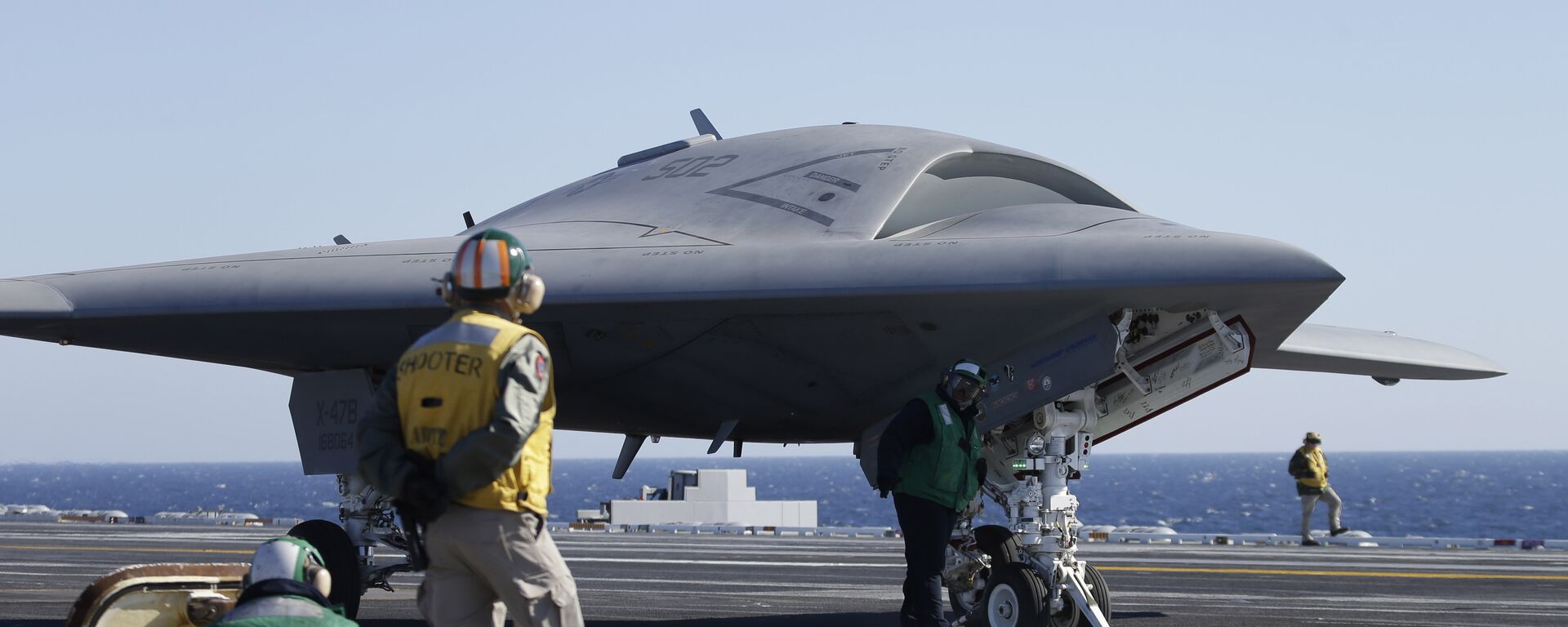https://sputnikglobe.com/20230906/pentagon-offers-new-details-on-ai-powered-programs-intended-to-counter-china-1113162301.html
Pentagon Offers New Details on AI-Powered Programs Intended to Counter China
Pentagon Offers New Details on AI-Powered Programs Intended to Counter China
Sputnik International
The Deputy secretary of defense outlined the Pentagon's AI driven autonomous weapons program called Replicate.
2023-09-06T22:47+0000
2023-09-06T22:47+0000
2023-09-06T22:45+0000
military
us department of defense (dod)
pentagon
world
artificial intelligence
artificial intelligence (ai)
drones
weapon systems
https://cdn1.img.sputnikglobe.com/img/07e7/09/06/1113162143_3:0:1454:816_1920x0_80_0_0_ef2927b747dfaffc6d40bfb5e1e1f915.png
The Pentagon is considering a vast network of artificial intelligence-powered (AI) autonomous systems and drones in what Deputy Secretary of Defense Kathleen Hicks says is designed to counter alleged threats posed by China.Announced last month, Hicks provided some more details on the program while taking questions during a speech at the Defense News Conference held in Arlington, Virginia, on Wednesday.Hicks detailed during an interview that the plan is to create thousands of drones and systems that are “small, smart [and] cheap.”The project, dubbed Replicator, will take place in all domains, including ground, air, sea and space.In the realm of air, Hicks proposed a system of “distributed pods” that could be powered by the sun or other “virtually limitless resources” and “packed with sensors” to give the military “information in near-real-time.”Other projects being considered in the program include ground-based systems that can scout ahead for troops and provide logistics support, autonomous anti-missile systems, and systems that could autonomously guard Department of Defense (DoD) assets.The program, Hicks said, is not being created because the DoD desires war, but rather to deter any potential attacks against Taiwan by China. The official further contended it would give the military an edge over China if conflict does come.China currently has more ships than the US Navy, an advantage of “mass” that Hicks described as “more ships, more missiles, more forces.” But rather than try to counter China “pound for pound,” she says the US must innovate to keep up.As evidence, Hicks pointed to the conflict in Ukraine, where drones have been indispensable for both sides.On that note, Hicks contends the Replicator program won’t require any new funds, saying it will take from already established funding. Earlier this year, the Pentagon authorized $1.8 billion in funding for artificial intelligence research in 2024.The Replicator program, Hicks says, will be able “to field autonomous systems at a scale of multiple thousands, in multiple domains, within the next 18-24 months" and will establish “all-domain, attritable autonomy” to overcome China’s anti-access and area denial programs, which will give US forces a significant advantage in any potential war.Many peace advocates and AI researchers have warned about handing weapons over to AI systems. In May, a United States Air Force spokesperson said an AI-powered drone “killed” its operator in a simulation, but later said he misspoke and no such simulation occurred. Updated quotes in articles covering the speech noted the spokesperson was describing a thought experiment.Hicks said the DoD’s track record of a “responsible and ethical approach to AI” and later added that the system would adhere to the DoD’s policy that “there is always a human responsible for the use of force.”
https://sputnikglobe.com/20230630/defense-secretary-should-run-artificial-intelligence-buys-for-us-military---watchdog-1111562255.html
https://sputnikglobe.com/20230830/us-plan-to-flood-pacific-with-ai-driven-drones-risks-uncontrollable-escalation-with-china-1112995388.html
world
Sputnik International
feedback@sputniknews.com
+74956456601
MIA „Rossiya Segodnya“
2023
News
en_EN
Sputnik International
feedback@sputniknews.com
+74956456601
MIA „Rossiya Segodnya“
Sputnik International
feedback@sputniknews.com
+74956456601
MIA „Rossiya Segodnya“
replicate, ai powered weapon systems, artificial intelligence weapons, ai in warfare, us artificial intelligence warfare
replicate, ai powered weapon systems, artificial intelligence weapons, ai in warfare, us artificial intelligence warfare
Pentagon Offers New Details on AI-Powered Programs Intended to Counter China
The first pilotless vehicles were developed by the United Kingdom and the United States during World War I but they were not used during the conflict. Reconnaissance drones were first used on a mass scale in Vietnam. However, deadly drone use exploded during the United States’ war on terror, first being used in Afghanistan in 2001.
The Pentagon is considering a vast network of artificial intelligence-powered (AI) autonomous systems and drones in what Deputy Secretary of Defense Kathleen Hicks says is designed to counter alleged threats posed by China.
Announced last month, Hicks provided some more details on the program while taking questions during a speech at the Defense News Conference held in Arlington, Virginia, on Wednesday.
Hicks detailed during an interview that the plan is to create thousands of drones and systems that are “small, smart [and] cheap.”
The project, dubbed Replicator, will take place in all domains, including ground, air, sea and space.
“Imagine constellations of ADA2 systems on orbit, flung into space scores at a time, numbering so many that it becomes impossible to eliminate or degrade them all,” Hicks said of the program’s potential in space.
In the realm of air, Hicks proposed a system of “distributed pods” that could be powered by the sun or other “virtually limitless resources” and “packed with sensors” to give the military “information in near-real-time.”
Other projects being considered in the program include ground-based systems that can scout ahead for troops and provide logistics support, autonomous anti-missile systems, and systems that could autonomously guard Department of Defense (DoD) assets.
The program, Hicks said, is not being created because the DoD desires war, but rather to deter any potential attacks against Taiwan by China. The official further contended it would give the military an edge over China if conflict does come.
China currently has more ships than the US Navy, an advantage of “mass” that Hicks described as “more ships, more missiles, more forces.” But rather than try to counter China “pound for pound,” she says the US must innovate to keep up.
As evidence, Hicks pointed to the conflict in Ukraine, where drones have been indispensable for both sides.
China does hold an advantage in numbers over the US but it is not immediately clear why that is as the United States' military budget dwarfs that of China’s.
For 2023, the US military budget stands at $778 billion compared to $224 billion in spending by China, according to official numbers. In 2024, the US Navy alone will have a $255.8 billion budget, exceeding China’s entire military budget.
On that note, Hicks contends the Replicator program won’t require any new funds, saying it will take from already established funding. Earlier this year, the Pentagon authorized $1.8 billion in funding for artificial intelligence research in 2024.

30 August 2023, 18:06 GMT
The Replicator program, Hicks says, will be able “to field autonomous systems at a scale of multiple thousands, in multiple domains, within the next 18-24 months" and will establish “all-domain, attritable autonomy” to overcome China’s anti-access and area denial programs, which will give US forces a significant advantage in any potential war.
Many peace advocates and AI researchers have warned about handing weapons over to AI systems. In May, a United States Air Force spokesperson said an AI-powered drone “killed” its operator in a simulation, but later said he misspoke and no such simulation occurred. Updated quotes in articles covering the speech noted the spokesperson was describing a thought experiment.
Hicks said the DoD’s track record of a “responsible and ethical approach to AI” and later added that the system would adhere to the DoD’s policy that “there is always a human responsible for the use of force.”




